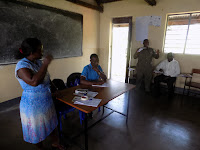The
baseline study findings conducted at the commencement of this project indicated
that violence against children mostly takes place at home contrary to the
National Orphans and other Vulnerable Children (OVC) Policy that indicates a
family is the first line of response to support the OVC. Other places mentioned
were schools and roads. Caning or beating is the mostly used form of punishment
reported all the participants. 63% of the households surveyed reported caning
as means of punishment used. Defilement was reported next as a form of abuse at
90% by 9/10 schools surveyed. Another form of abuse reported was denial of
education and food that was mostly reported in Bukonzo County.
The
frequency of punishing children in homes on average is once a week. Parents
reported that punishments are often emotionally motivated rather than reason.
Children mostly respond to violence by reporting to parents, teachers and the
police. They are mostly affected by violence in terms of contracting diseases,
others drop out of school and some girls get pregnant. Half of the key
informant children reported emotional effects like sadness and crying. All the
participants in the baseline study recommended sensitization to curb down abuse
in the district.
RIDE
AFRICA therefore facilitated the Women Groups of Kakindo, Hope for Uganda, Tweteraine
Block B Group and Youth groups in Maliba and Kitswamba sub-counties to conduct
community sensitization activities for the prevention of violence against
children in homes and communities. A
total of 117 participants; 103 females and 14 males were involved.
The
sensitization activities have enabled the communities to acquire information
and knowledge about the rights of children and their responsibilities, the reporting
procedures of children abuses and violations as well as gaining confidence to
report the child abusers to the authorities.
The
women and girls in the local communities have also been trained in making
reusable sanitary pads so as to promote hygiene and also reduce the number of
girl child drop out in school.













